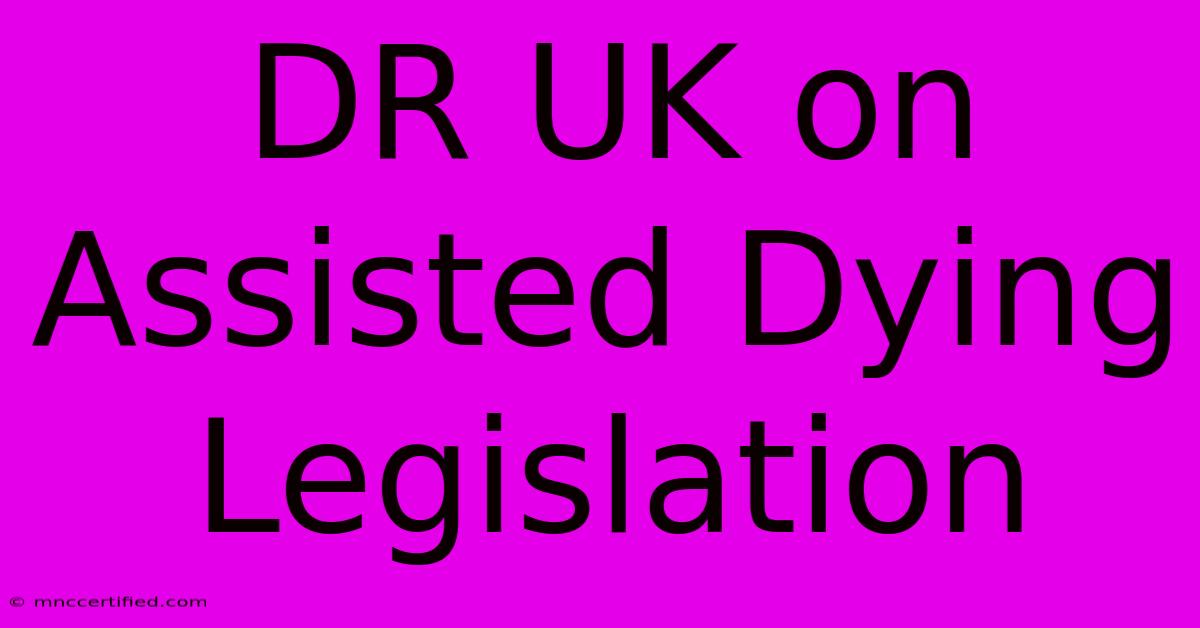DR UK On Assisted Dying Legislation

Table of Contents
DR UK on Assisted Dying Legislation: A Comprehensive Overview
The debate surrounding assisted dying in the UK is complex and deeply emotional. Disability Rights UK (DR UK) plays a significant role in this conversation, advocating for the rights and perspectives of disabled people. This article explores DR UK's stance on assisted dying legislation, examining their arguments and concerns.
DR UK's Position: Protecting Vulnerable People
DR UK consistently opposes assisted dying legislation in its current form. Their primary concern centers on the potential for coercion and abuse, particularly towards vulnerable individuals, including disabled people. They argue that existing legislation and support systems need strengthening, rather than introducing a system that could inadvertently harm those most at risk.
Key Concerns of DR UK:
-
Coercion and Pressure: DR UK highlights the significant risk that disabled people, facing societal pressure and feelings of being a burden, could be coerced into choosing assisted dying, even if it's not their true desire. This is particularly relevant for individuals with disabilities that may limit their ability to fully express their wishes.
-
Inadequate Access to Palliative Care: The organization emphasizes the need for high-quality, readily available palliative care as a crucial alternative to assisted dying. They argue that if palliative care was universally accessible and effective, the demand for assisted dying might significantly decrease. Addressing gaps in palliative care access, particularly for disabled people, is a key priority.
-
Discrimination and Prejudice: DR UK points to the societal biases and prejudices against disabled people that could influence medical professionals' assessments and decisions related to assisted dying. This concern underlines the importance of ensuring impartial and unbiased evaluations.
-
Lack of Safeguards: Even with proposed safeguards in place, DR UK remains skeptical that they can effectively prevent abuse and coercion. They argue that the inherent vulnerabilities of disabled individuals make them particularly susceptible to unintended consequences.
-
Slippery Slope Argument: While acknowledging this is a complex argument, DR UK also expresses concern that legalizing assisted dying could lead to a "slippery slope," potentially expanding eligibility criteria and ultimately undermining the protection of vulnerable individuals.
DR UK's Proposed Solutions: Strengthening Support Systems
Instead of advocating for assisted dying, DR UK focuses on improving existing systems to better support disabled people and those facing terminal illness. Their proposed solutions include:
-
Improved Access to Palliative Care: This is a central pillar of DR UK's approach. They push for increased funding, training, and resources for palliative care services, ensuring they are accessible and appropriate for all individuals, regardless of their disability or location.
-
Enhanced Social Support Systems: DR UK advocates for strengthening social care networks, providing individuals with better access to support, reducing feelings of isolation and burden.
-
Addressing Societal Attitudes: Changing societal perceptions of disability and aging is crucial, according to DR UK. This involves challenging ableist attitudes and promoting a more inclusive society that values the lives of all individuals, regardless of their abilities.
-
Increased Funding for Disability Services: DR UK champions improved access to disability-specific services and support, thereby enhancing the quality of life and reducing feelings of despair among disabled people.
Conclusion: A Focus on Inclusivity and Support
DR UK's position on assisted dying legislation reflects a deep commitment to protecting the rights and well-being of disabled people. They advocate for a society that prioritizes inclusive support systems and high-quality palliative care, rather than a system that could potentially expose vulnerable individuals to further harm. Their work highlights the importance of a comprehensive approach that addresses the root causes of suffering, rather than offering a potentially dangerous solution. The ongoing debate requires careful consideration of all perspectives, particularly those of the most vulnerable within society.

Thank you for visiting our website wich cover about DR UK On Assisted Dying Legislation. We hope the information provided has been useful to you. Feel free to contact us if you have any questions or need further assistance. See you next time and dont miss to bookmark.
Featured Posts
-
Glossier Brow Flick Versatile Pencil 30 Uses
Nov 30, 2024
-
College Football Schedule And Picks
Nov 30, 2024
-
Signed Brothers Bond Bourbon
Nov 30, 2024
-
Bond No 9 New Haarlem Sample
Nov 30, 2024
-
Sheffield Utd Vs Sunderland Afc Preview
Nov 30, 2024